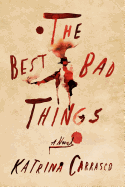
Katrina Carrasco's The Best Bad Things transports readers back to 1887, when a sting set up by Pinkerton agents and police detectives takes down a booming West Coast smuggling ring. "This is going to be the police bust of the decade," notes one detective to another during their investigation. "It's got shanghaiing, girls, opium... Everyone will be watching." Indeed, everyone is watching--including Alma Rosales, a one-time Pinkerton agent who now works for Delphine Beaumond, the mastermind behind the crime ring. Alma goes deep undercover in her preferred role as Jack Camp, a smart-mouthed ruffian who spars as readily with his fists as with his words.
Therein lies the thrill of Carrasco's incredible debut. She has flipped the classic historical detective novel on its head, imbuing it with a sense of feminism and sexuality that never feels out of place for the setting she has chosen. Here identities are as fluid as characters' loyalties, and women in particular exercise their power by stepping either fully into or entirely out of the roles society expects them to play.
The Best Bad Things is a novel that lives in a kind of moral grey area: its characters are neither good nor bad, but simply human--power-hungry, weak, scared, insecure, frustrated, in love, vengeful and flawed though they may be. Carrasco's short, choppy prose perfectly reflects the tension that thrums across every page of the novel, as Alma enters a world of double-crossing, secret identities, violence and lust that would leave even Don Corleone red in the face. --Kerry McHugh, blogger at Entomology of a Bookworm

